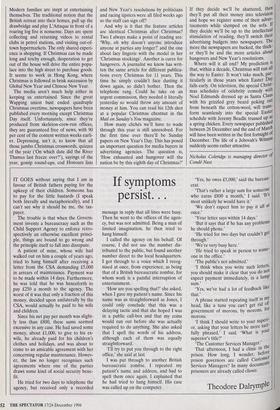If symptoms persist. . .
IT GOES without saying that I am in favour of British fathers paying for the upkeep of their children. Someone has to pay for the little bastards (I speak both literally and metaphorically), and I can't see why it should be me, the tax- payer.
The trouble is that when the Govern- ment invents a bureaucracy such as the Child Support Agency to enforce retro- spectively an otherwise excellent princi- ple, things are bound to go wrong and the principle itself to fall into disrepute.
A patient of mine, whose wife had walked out on him a couple of years ago, tried to hang himself after receiving a letter from the CSA demanding £5,000 in arrears of maintenance. Payment was to be made within 14 days. Furthermore, he was told that he was henceforth to pay £250 a month to the agency. The worst of it was that only a fraction of this money, decided upon unilaterally by the CSA, would actually be paid to his wife and children.
Since his net pay per month was slight- ly less than £800, these sums seemed excessive in any case. He had saved some money, about £1,000, to give to his ex- wife, he already paid for his children's clothes and holidays, and was about to come to an amicable agreement with her concerning regular maintenance. Howev- er, the law no longer recognises such agreements where one of the parties drawS some kind of social security bene- fit.
He tried for two days to telephone the agency, but received only a recorded
message in reply that all lines were busy. Then he went to the offices of the agen- cy, but was not admitted. Being a man of limited imagination, he then tried to hang himself.
I called the agency on his behalf. Of course, I did not use the number dis- tributed to the public, but found another number direct to the local headquarters. I got through to a voice which I recog- nised at once, from experience, as being that of a British bureaucratic zombie, for whom work is a painful interruption of entertainment.
`How are you spelling that?' she asked, when I gave my patient's name. Since his name was as straightforward as Jones, I could only conclude that this was a delaying tactic and that she hoped I was in a public call-box and that my coins would run out before she was actually required to do anything. She also asked that I spell the words of his address, although each of them was equally straightforward.
`I'll try to put you through to the right office,' she said at last.
I was put through to another British bureaucratic zombie. I repeated my patient's name and address, and had to spell them once again. I explained that he had tried to hang himself. His case was called up on the computer.
`Yes, he owes £5,000,' said the bureau- crat.
`That's rather a large sum for someone who earns £800 a month,' I said. 'Ws most unlikely he would have it.' `We don't expect him to pay it all at once.'
`Your letter says within 14 days.' `But it says that if he has any problems he should phone.' `He tried for two days but couldn't get through.'
`We're very busy here.'
`He tried to speak in person to some- one in the office.'
`The public's not admitted.'
`I think when you write such letters, you should make it clear that you do not expect payment immediately, in a lump sum.'
`Yes, we've had a lot of feedback like that.'
A phrase started repeating itself in inY head, like a tune you can't get rid of government of morons, by morons, for morons.
`I think I should write to your supert" or, asking that your letters be more tact' fully phrased,' I said. 'What is Your superior's title?' `The Customer Services Manager.'
That afternoon, I had a clinic in the prison. How long, I wonder, before prison governors are called Customer Services Managers? In many documents prisoners are already called clients.
Theodore Dalrymple










































































































 Previous page
Previous page